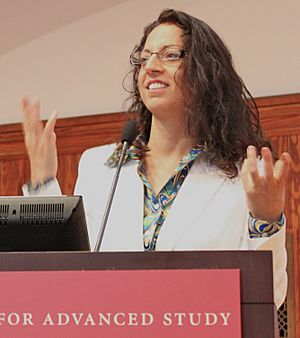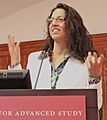Kristen Ghodsee facts for kids
Quick facts for kids
Kristen Ghodsee
|
|
|---|---|

Ghodsee in 2011
|
|
| Born |
Kristen Rogheh Ghodsee
April 26, 1970 |
| Nationality | American |
| Alma mater |
|
| Awards | Guggenheim Fellowship |
| Scientific career | |
| Fields | Ethnography Gender theory Feminism Utopianism Anthropology |
| Institutions | University of Pennsylvania |
Kristen Rogheh Ghodsee (born April 26, 1970) is an American professor and expert on Eastern Europe. She teaches at the University of Pennsylvania. She is well-known for her studies of Bulgaria after the fall of communism. She also researches how gender roles changed in these countries.
Professor Ghodsee has looked at how Muslim groups changed after communist rule. She also studies how old ideas from Marxism–Leninism mix with Islamic beliefs. Her work includes looking at people who miss the communist past, the history of Marxist feminism, and the idea of a perfect society (utopianism).
Contents
Kristen Ghodsee's Journey in Education
Kristen Ghodsee earned her first degree from the University of California at Santa Cruz. She then received her PhD from the University of California, Berkeley. She has won many research awards. These include grants from the National Science Foundation and Fulbright.
She has also been a visiting scholar at many important places. These include the Institute for Advanced Study in Princeton and Harvard University. In 2012, she was chosen to lead the Society for Humanistic Anthropology. In 2021, she was a guest professor in Paris, France. In July 2022, she became the head of the Russian and East European Studies Department at the University of Pennsylvania.
Exploring Life After Communism
Professor Ghodsee's work often looks at how people's lives changed after communism ended. She studies how societies in Eastern Europe adapted to new ways of life.
Understanding "Red Nostalgia"
In 2004, Kristen Ghodsee wrote about "red nostalgia." This is when people in Eastern Europe felt a longing for some parts of their communist past. Earlier studies thought this was just people missing their youth. But Ghodsee showed it was more than that.
She explained that people missed real benefits. These included things like steady jobs and social support. For many, "red nostalgia" was a way to criticize the big changes. These changes brought economic problems and inequality after communism.
Looking at History and Memory
Ghodsee has also studied how people remember the past in countries like Bulgaria. She looks at how World War II and the Holocaust in Bulgaria are remembered. She has discussed groups that try to compare communism to the Nazi Holocaust.
She argues that some groups claim communism killed "100 million" people. Ghodsee says this number is questionable. She believes these efforts try to silence discussions about good things that happened under communism. These good things included better education, women's rights, and social security. She suggests these ideas became stronger after the 2008 financial crisis. This was a time when many people faced economic hardship.
The Impact of the Cold War's End
In her 2017 book, Red Hangover, Ghodsee talks about the end of the Cold War. She says that Western countries celebrated too much. They also linked all socialist ideas to the bad parts of Stalinism. This, she argues, allowed a new economic system, neoliberalism, to take over.
She believes this led to economic problems in Eastern Europe and the West. These problems included job losses and more inequality. This situation, she says, helped extreme right-wing nationalism grow. Ghodsee suggests it's time to rethink how societies are organized. She hopes for a new political idea that can lead to a better future.
Writing About People's Lives
Kristen Ghodsee also writes in a special way called "literary ethnography." This means she combines academic research with storytelling. She uses details, conversations, and descriptive writing. This makes her academic books easier for more people to read.
Her book, Lost in Transition, uses personal stories and fiction. It shows what everyday life was like after communism. Some readers found the book "compelling and highly readable." Others felt it focused too much on stories and not enough on academic theories. However, many outside of universities found it "impossible to put down."
Awards and Recognition
Professor Ghodsee has received many awards for her books and articles.
Her 2010 book, Muslim Lives in Eastern Europe, won several prizes. These included the Barbara Heldt Prize and the Harvard University/Davis Center Book Prize. It also won the John D. Bell Book Prize and the William A. Douglass Prize.
In 2011, her short story "Tito Trivia" won the Ethnographic Fiction Prize. This story was part of her book, Lost in Transition. In 2012, she won a Guggenheim Fellowship. This is a very important award for her work in anthropology.
Discussions About Feminism
In 2014, a scholar named Nanette Funk discussed Ghodsee's work. Funk suggested that Ghodsee and others praised women's groups from the communist era too much. Funk felt they ignored the strict nature of those governments.
Ghodsee responded by saying her work aims to broaden the idea of feminism. She believes feminism should improve women's lives in many ways. She points out that communist policies often led to real improvements. These included better education for women and access to healthcare. They also helped women become less financially dependent on men.
About Kristen Ghodsee's Life
Kristen Ghodsee has a mixed background. Her father was Persian, and her mother was Puerto Rican. She grew up in San Diego. While in college, she met and married a Bulgarian law student. She has one teenage daughter.
Books by Kristen Ghodsee
- Kristen R. Ghodsee, Everyday Utopia: What 2,000 Years of Wild Experiments Can Teach Us About the Good Life. New York: Simon & Schuster, 2023. ISBN: 978-1982190217
- Kristen Ghodsee, Red Valkyries: Feminist Lessons from Five Revolutionary Women. New York and London: Verso Books, 2022. ISBN: 978-1839766602
- Kristen Ghodsee and Mitchell A. Orenstein, Taking Stock of Shock: Social Consequences of the 1989 Revolutions. New York: Oxford University Press, 2021. ISBN: 978-0197549247
- Kristen R. Ghodsee, Second World, Second Sex: Socialist Women's Activism and Global Solidarity during the Cold War, Durham, Duke University Press, 2019. ISBN: 978-1478001812
- Kristen R. Ghodsee, Why Women Have Better ... Under Socialism and other arguments for economic independence, Nation Books, 2018. ISBN: 9781568588902
- Kristen Ghodsee, Red Hangover: Legacies of Twentieth-Century Communism, Durham, Duke University Press, 2017. ISBN: 978-0822369493
- Kristen Ghodsee, From Notes to Narrative: Writing Ethnographies that Everyone Can Read. Chicago: University of Chicago Press, 2016. ISBN: 978-0226257556
- Kristen Ghodsee, The Left Side of History: World War II and the Unfulfilled Promise of Communism in Eastern Europe, Durham, Duke University Press, 2015. ISBN: 978-0822358350
- Kristen Ghodsee, Lost in Transition: Ethnographies of Everyday Life After Communism, Durham: Duke University Press, 2011. ISBN: 978-0822351023
- Kristen Ghodsee, Muslim Lives in Eastern Europe: Gender, Ethnicity and the Transformation of Islam in Postsocialist Bulgaria. Princeton: Princeton University Press, 2009. ISBN: 978-0691139555
- Kristen Ghodsee, The Red Riviera: Gender, Tourism and Postsocialism on the Black Sea, Durham: Duke University Press, 2005. ISBN: 978-0822336624
- Rachel Connelly and Kristen Ghodsee, Professor Mommy: Finding Work/Family Balance in Academia, Rowman & Littlefield Publishers, Inc., 2011. ISBN: 978-1442208582
Images for kids
 | Calvin Brent |
 | Walter T. Bailey |
 | Martha Cassell Thompson |
 | Alberta Jeannette Cassell |


